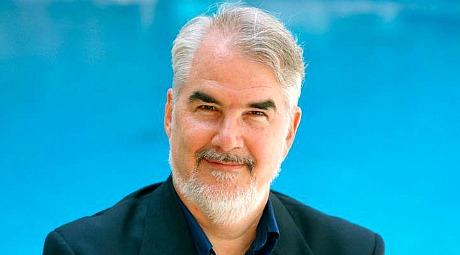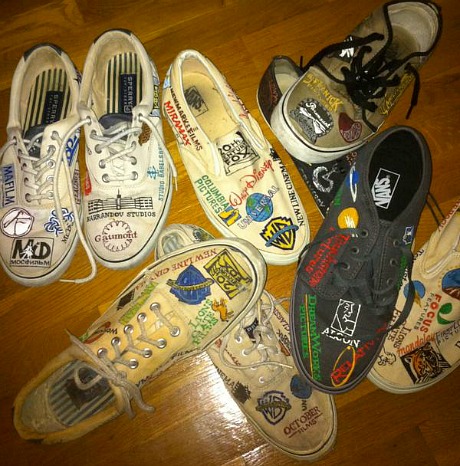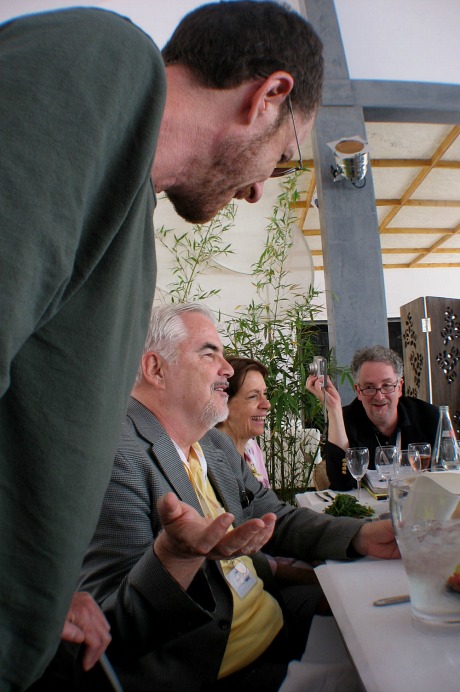Old-school, classic-era film critic Richard Corliss, one of the brightest, sharpest and most highly regarded film seers and scholars of the late 20th Century and early aughts, a guy whose opinions caused shifts in the tectonic plates of Hollywood commerce during his Time days of the ’80s and ’90s, died last night from a stroke. He was only 71. I’m sure he was planning to cover next month’s Cannes Film Festival, which he’s been attending without fail for decades (and at which he always wore those same color-dappled, studio-logo slip-on canvas sneakers), and I’ll bet he’s hugely pissed about missing it.

Richard Corliss (1944 – 2015).
Sad hugs and condolences to his wife Mary and all his friends, colleagues, ex-editors and admirers.
From my struggling freelance perspective the four biggest guns of the Manhattan film critic realm in the ’70s and ’80s were Corliss, Pauline Kael, Andrew Sarris and Richard Schickel, who’s thankfully still with us. There’s a certain metaphor in the passing of these departed legends of print, prose and inspired perception. FishbowlNY‘s Richard Horgan commented last September on the gradual weakening of the power of the classic film critic gang and the rise of online film crowd and the passing of the baton.
Perhaps my favorite all-time Corliss line was describing George Miller‘s The Road Warrior (’82) as “Apocalypse Pow!”
His Wiki page says that Corliss and Martin Scorsese came up with the idea for a special issue (Time or Film Comment?) on “guilty pleasures.” He also coined the term “drop-dead gorgeous.” I remember that he was the first major critic to pan Titanic, and I recall sitting in the offices of People as I read his review and saying to myself, “Wow, he really missed the boat on this one.” Consider all the HE links to Corliss’s opinions that I’ve run over the years. And please click for large-format photo of No Country For Old Men Cannes Film Festival luncheon, which I attended with Corliss, Ethan Coen, Harlan Jacobson, et. al. — one of my all-time favorite shots.
“It’s painful to try to find words, since Richard was such a master of them,” said Time editor Nancy Gibbs in a note to staffers. “They were his tools, his toys, to the point that it felt sometimes as though he had to write, like the rest of us breathe and eat and sleep. It’s not clear that Richard ever slept, for the sheer expanse of his knowledge and writing defies the normal contours of professional life.
“Everyone who had the pleasure of working with [Richard] has stories of his kindness, his quirks, his humor, his obsessions, the bright, fresh breezes of his head and heart.”
That’s not 100% true. Corliss was a nice enough guy socially and he certainly knew his stuff like few others, but for whatever reason he could be a bit snooty with freelancers and anyone he didn’t regard as his kind of film maven, or someone who wasn’t on his level. I’ll never forget that Sarris was friendly with me when I was a nobody, but Corliss never gave me the time of day. He was Mr. King Shit at Film Comment when I first moved to Manhattan in ’78. He edited that once-hugely-influential magazine from 1970 to 1982, the rock-out years.
The tireless Dan Yakir once told me about visiting Corliss at his Film Comment office for a pitch meeting, and waiting and waiting while Corliss was on the phone with someone he was obviously enjoying talking to or admired greatly or whatever. Corliss went on and on with the call (12 or 15 minutes, something like that), chuckling and joking and bantering on and on, and then he finally said “bye” and hung up and said to Yakir, “Okay, you’ve got three minutes.”
Corliss was born and raised in Philadelphia. He was a lifelong liberal, but his first significant film critic gig (’66 to ’70) was with National Review. He also wrote for New Times, Maclean’s and the old Soho Weekly News in 1980. He joined Time in ’80, initially as an associate editor and then senior writer in ’85. As the print version of Time began to matter less and less Corliss shifted to time.com.
The Wiki page says Corliss “was a guest on Charlie Rose 14 times, most of these times during the 1990s with Janet Maslin and David Denby. His most recent appearance on the show was in December 2005 to talk about the year in film. Corliss also appeared on A&E Biography to talk about the life and work of Jackie Chan. He also appeared in Richard Schickel’s documentary about Warner Brothers.”
More Wiki: “Corliss has attended the Cannes Film Festival along with Roger Ebert and Todd McCarthy for the longest period of any U.S. journalist. Today he blogs from Cannes at Time.com. He also attends festivals in Toronto and Venice. Corliss used to work on the board of the New York Film Festival, but resigned in 1987 after longtime head Richard Roud was fired due to his challenging of editorial direction of the festival.”


Corliss regaling colleagues and director-writer Ethan Coen (standing) at Cannes press luncheon for No Country for Old Men.
